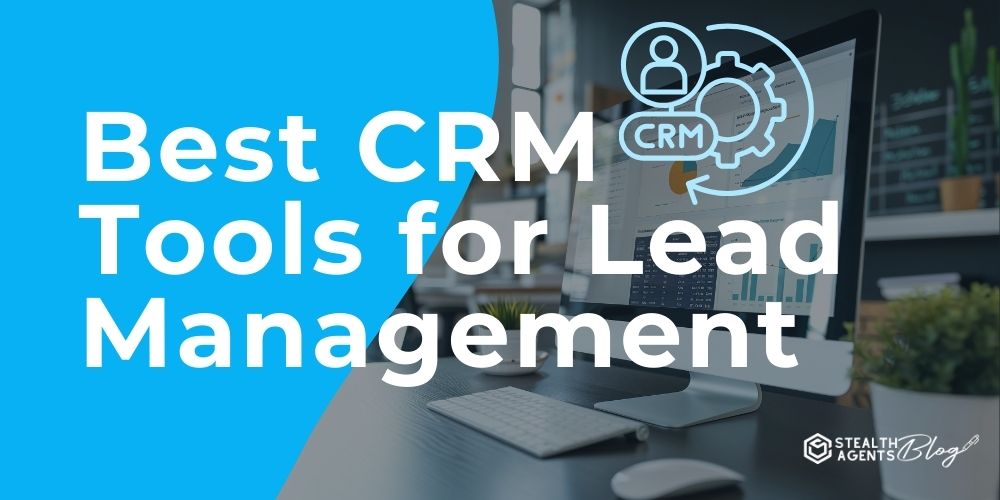CRM tools for lead management are essential for organizing prospects, tracking interactions, and closing more deals efficiently. Stealth Agents helps businesses seamlessly implement and manage the right CRM solution—so you can focus on growing revenue while they handle the setup, automation, and support.
Make Lead Management Easier with the Right CRM Tools
Picking the right CRM for lead management can make a huge difference in your business growth.
In fact, companies that use CRM tools effectively see up to a 29% boost in sales.
With so many options out there, it’s important to find one that fits your workflow and goals.
That’s where Stealth Agents can help. We’ll match you with a virtual assistant who’s trained in the best CRM tools for your lead management needs.
Want to learn more? Book a free call today and let’s talk about what you’re looking for.
What’s a Lead Management CRM Tool?
A lead management CRM tool helps you keep track of your leads and stay organized as you move them through the sales process.
It puts all your lead info in one place, so your team can easily see every interaction and follow up at the right time.
These tools also save you time by automating tasks like reminders and lead scoring, helping you focus on the leads that matter most. Businesses using CRM tools have seen sales go up by as much as 29%, so they really do work.
Plus, CRM software often includes helpful reports and analytics, giving you insight into what your leads are doing and how to better engage with them.
With the CRM market expected to hit $82 billion by 2025, it’s clear that these tools are becoming more and more important, especially for small businesses looking to grow and convert more leads.
What Can a Lead Management CRM Tool Do?
Here are some key features that make lead management CRMs so useful:
- Talk to leads right inside the CRM – All your messages and follow-ups stay in one place, so nothing gets lost.
- Auto-updates after calls and emails – Every time you reach out, the CRM updates the lead’s info automatically, keeping everything current.
- Call recording and logging – You can record calls and save them straight to the contact’s profile no jumping between apps.
- Templates and automation – Use ready-made templates and workflows to stay on schedule and keep your messages consistent.
- Team performance tracking – Built-in reports show how each team member is doing and help you improve your overall strategy.
- Data cleanup tools – Keep your contact list neat by removing duplicates or outdated info automatically.
These tools make it easier to manage leads and close more deals without all the manual work.
What are the Differences Between Lead Management and Pipeline Management?
While lead management and pipeline management often get mentioned together in conversations about sales growth, they’re not quite the same—and understanding their distinction can supercharge your CRM strategy.
Lead Management:
Think of lead management as the process of capturing, organizing, and nurturing potential clients from the very first spark of interest. This part of your CRM system is focused on activities like:
- Collecting prospects from various sources
- Tracking initial interactions and engagement
- Qualifying leads based on interest and readiness
- Assigning follow-up tasks and prioritizing outreach
Pipeline Management:
Pipeline management, on the other hand, zooms out to follow each opportunity’s entire journey through your sales funnel. Here, the emphasis is on:
- Visualizing every stage a deal passes through, from first contact to winning or losing the sale
- Monitoring movement between stages to spot bottlenecks
- Forecasting revenue based on deal progress
- Optimizing the sales process for better conversion rates
In Short: Lead management is about handling raw prospects and ensuring no opportunity slips through the cracks, while pipeline management is about overseeing and advancing those opportunities as they progress toward becoming customers.
Both work hand-in-hand to deliver a seamless, effective sales process and are cornerstones of robust CRM tools for lead management.
Helpful Resources for Lead Generation and Management
To streamline your lead generation efforts and effectively guide prospects through the sales funnel, a variety of valuable resources are available:
- Step-by-Step Video Guides:
Access practical tutorials that break down how to create a winning lead generation strategy from scratch, using real-world examples for easier implementation.
- In-Depth Blog Articles:
Discover comprehensive blog posts that walk you through lead management at every stage. These resources often include expert tips, actionable checklists, and common pitfalls to avoid—ideal for refining your process whether you’re new or experienced.
- Free Online Courses and Certifications:
Take advantage of training programs offered by renowned organizations such as Coursera, LinkedIn Learning, and Salesforce Trailhead. These courses cover everything from fundamental lead management principles to advanced sales funnel optimization.
- Interactive Webinars and Workshops:
Join live or recorded sessions with marketing professionals where you can learn strategies, ask questions, and apply best practices in real time.
What are the Key Features of CRM Tools Lead Management?
-
Contact Management
Effective contact management is a key feature in CRM tools lead management, which allows businesses to store and organize customer information.
This feature helps track all interactions with each lead, ensuring no touchpoint is missed.
By having a centralized database, sales and marketing teams can always access the full context on every lead, including emails, calls, meetings, and notes—no matter which team member handled the previous interaction.
This comprehensive view enables more informed and personalized follow-ups, reducing the risk of leads slipping through the cracks due to missed or duplicate outreach
According to research, businesses using CRM tools with robust contact management can increase customer retention by up to 27%.
Proper contact management also enables easier segmentation of leads based on various criteria such as demographics or interaction history.
This segmentation is crucial for personalized communication and targeted marketing efforts. Additionally, it simplifies following up with leads, ensuring timely engagement.
With organized contact data, sales teams can focus on nurturing relationships and converting leads, making it one of the top CRM software for sales teams.
-
Lead Tracking and Scoring
Another essential feature is the ability to track and score leads, which helps prioritize sales efforts.
Lead tracking enables businesses to monitor the progress of each lead through the sales funnel and their interactions with the company.
Lead scoring assigns values to leads based on their behavior and attributes, enabling sales teams to focus on high-potential prospects.
Studies show that organizations using lead scoring see a 20% increase in sales opportunities. This feature ensures that sales teams invest their time wisely, focusing on leads that are most likely to convert.
It also helps identify patterns in successful lead interactions and guides future strategies. Businesses can effectively tailor their approaches to different segments by understanding the behavior of leads.
-
Automation of Tasks
Automation is crucial in CRM tools, lead management, and handling repetitive tasks such as sending follow-up emails or scheduling appointments.
This feature saves time and reduces errors, enabling sales teams to concentrate on critical aspects of lead management.
Companies that automate lead management tasks report a 10% increase in productivity.
Automated workflows ensure consistent communication with leads, maintaining engagement throughout the sales process.
It also helps organize the sales pipeline by automatically updating lead statuses and reminders.
Automation leads to faster response times, thereby enhancing the customer experience and satisfaction—efficient task management through automation results in better resource allocation and higher conversion rates.
-
Reporting and Analytics
Comprehensive reporting and analytics are vital in CRM tools lead management, providing insights into lead management performance.
These features enable businesses to track key metrics, including conversion rates, response times, and sales pipeline status.
Analyses help to identify successful strategies and areas needing improvement, driving data-driven decision-making.
According to industry statistics, 62% of businesses using CRM analytics report improved customer insights.
Detailed reports enable management to forecast sales and plan accordingly, ensuring alignment with business goals. Companies can fine-tune their approaches to lead generation and nurture by analyzing data.
Access to analytics enables the continuous improvement and refinement of lead management processes, underscoring the importance of customer relationship management.
-
Integration Capabilities
Integration capabilities in a CRM for B2B lead tracking are essential for creating a connected business ecosystem. By integrating with tools like email, marketing automation, and customer support platforms, businesses can streamline operations and improve team collaboration. The best CRM for sales teams ensures that data flows seamlessly across departments, eliminating silos and enhancing communication.
This integration empowers teams to access a unified view of customer interactions, which is crucial for planning and executing cohesive strategies. Many top CRM for small businesses offer robust integration features, making it easier to connect all your tools without complex setups.
With CRM to track leads and deals, businesses can ensure better data accuracy, accessibility, and efficiency in decision-making. Integration capabilities are particularly important for businesses seeking an affordable CRM with lead scoring and a focus on scalability.
- Customization Options
Customization allows businesses to adapt their CRM tools to meet specific lead management needs, making it ideal for businesses searching for CRM with sales pipeline features. This flexibility ensures that the system aligns with unique workflows and sales processes, boosting overall efficiency.
By choosing a CRM to track leads and deals, businesses can create custom dashboards and reports to monitor key metrics. Companies that use customizable systems often experience higher user adoption rates, which is essential for successful implementation.
The best CRM for sales teams offers personalization features that support tailored communication strategies and enhance lead nurturing efforts. For small businesses, finding an affordable CRM with lead scoring options ensures the system can grow alongside them. Customization ensures that the CRM assistant addresses unique challenges while maximizing opportunities for success.
- Mobile Access
Mobile access in a CRM for B2B lead tracking is crucial for remote teams and on-the-move sales staff. It enables employees to update and retrieve lead information in real time, ensuring productivity even outside the office. The best CRM for sales teams with mobile functionality allows faster responses to leads, which enhances engagement and builds trust.
Employees can use mobile-friendly CRM tools to track leads and deals effectively, reducing delays and improving accuracy. CRMs with sales pipeline features and mobile capabilities make it easier to view progress and manage tasks on the go. For small businesses, an affordable CRM with lead scoring and mobile access enhances flexibility and ensures a scalable solution.
Mobile access is an essential feature for any CRM assistant, providing teams with the tools they need to stay connected and productive from anywhere.
How do CRM Tools Improve Lead Management Processes?
CRM tools lead management to significantly improve lead management processes by centralizing customer information and providing a comprehensive view of interactions.
This centralization enables the tracking of each lead’s journey, ensuring that no potential customer slips through the cracks.
By automating routine tasks such as follow-up emails and appointment scheduling, CRM tools free up time for sales teams to focus on engaging with high-potential leads.
According to industry data, businesses using CRM systems report a 41% increase in revenue per salesperson.
These tools also offer lead scoring capabilities, helping prioritize which leads are more likely to convert.
Analytics features in CRM systems offer valuable insights into lead behavior, enabling businesses to tailor their engagement strategies more effectively.
CRM tools streamline communication, enhance productivity, and lead to better conversion rates, making hiring a CRM management virtual assistant beneficial.
Which CRM Tools Are Best for Small Businesses Focused on Lead Management?
Here are some great CRM options small businesses can rely on to track leads, follow up effectively, and boost sales:
✔ HubSpot CRM
HubSpot is a favorite for small businesses because it offers a free plan with all the basics you need.
You can track customer interactions, manage your sales pipeline, and even schedule meetings right from the platform.
Its clean, user-friendly interface makes it easy to get started—no tech skills required.
HubSpot says users see up to a 20% boost in sales productivity.
It also connects with your marketing tools and gives you helpful analytics so you can keep improving your sales process.
If you’re just getting started with lead management, HubSpot is a solid, all-in-one choice.
✔ Zoho CRM
Zoho CRM is another great option, especially if you’re looking for something affordable with powerful features.
It includes lead scoring, automation, and reports to help you focus on the right leads.
Users have reported up to a 23% increase in lead conversions using Zoho.
It works well with other Zoho tools and third-party apps, and the mobile app lets you manage leads on the go.
With lots of customization options, Zoho CRM gives small businesses the flexibility they need.
✔ Pipedrive
Pipedrive stands out for its simple and visual approach to managing leads.
It lets you see exactly where each lead is in the pipeline, so you don’t lose track of opportunities.
Users have seen up to a 28% bump in sales after using Pipedrive.
The platform keeps sales teams organized with reminders and task tracking.
It also works well with tools like Google Apps and MailChimp.
If you like keeping things visual and straightforward, Pipedrive is a great fit.
✔ Freshsales
Freshsales, part of the Freshworks suite, packs in strong lead management tools without being overwhelming.
You’ll get lead scoring, email tracking, and workflow automation to help you follow up faster.
Users say they’ve improved lead response times by up to 40%.
Freshsales also uses AI to highlight your best leads, helping you focus on what matters.
It works seamlessly with other Freshworks products and has a mobile app for managing leads on the move.
It’s affordable and efficient—perfect for growing teams.
✔ Salesforce Essentials
Salesforce Essentials is the small business version of one of the world’s top CRMs.
It helps you track leads, stay organized, and automate everyday tasks.
Many users report a 29% jump in productivity after switching to Salesforce.
It’s easy to use, even for non-tech teams, and connects with other Salesforce tools as your business grows.
With helpful analytics and reporting, you can keep improving how you manage leads over time.
As a trusted name in CRM, Salesforce provides a solid foundation for small businesses to grow their lead management efforts, mainly when supported by a CRM implementation virtual assistant.

How can Stealth Agents Assist in Selecting the Right CRM Tool for Businesses?
Stealth Agents is the top choice for businesses seeking the ideal CRM tool to meet their specific needs.
With a deep understanding of various CRM systems, Stealth Agents evaluates your business requirements to recommend the most suitable options for your needs.
Clients report a 30% improvement in CRM satisfaction after consulting with Stealth Agents.
Their expertise ensures a seamless selection process, saving you time and reducing the risk of investing in an ill-fitting CRM.
Through personalized consultations, they provide insights into the features and benefits of different CRM tools and align them with your business goals.
Stealth Agents also offers ongoing support to ensure the CRM tool is effectively integrated into your daily operations.
Choosing Stealth Agents guarantees a strategic approach to enhancing your lead management capabilities.
Takeaways
The best CRM tools for lead management, like Stealth CRM, offer a streamlined approach to tracking and nurturing potential customers through the sales funnel. These lead management tools centralize lead data, making it easier for sales teams to monitor interactions and progress.
A CRM to manage leads, such as CRM Lead Management Software, enables businesses to focus on high-priority leads by automating repetitive tasks like sending follow-up emails and assigning lead scores. Statistics show that companies using CRM systems, including the best CRM for leads, can achieve a 29% increase in sales, demonstrating their value.
Many solutions, such as a CRM with lead management for small businesses or a CRM for B2B lead tracking, offer analytics that provide insights into lead behavior, helping create targeted strategies.
As the global CRM market is projected to reach $82 billion by 2025, the significance of choosing the right tool continues to grow.
CRM tools are indispensable for improving sales efficiency and boosting conversion rates.













